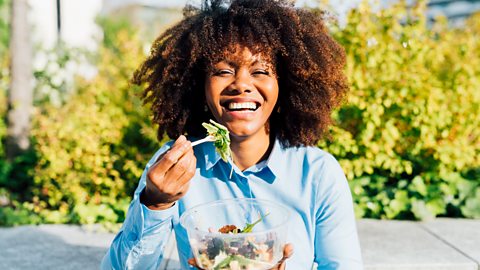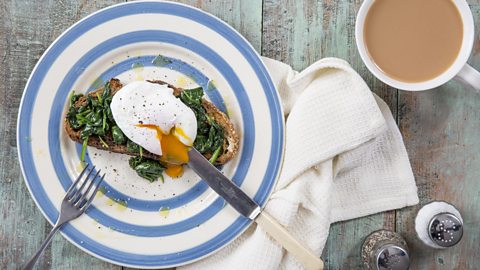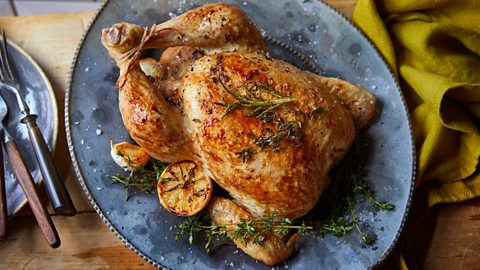Can food boost your serotonin levels?
Most of us are aware that a healthy diet is good for our mental and physical health. But some research suggests certain foods may help boost levels of serotonin, known as the βfeel-goodβ chemical. Is this true?
By Sue Quinn

You might have heard of serotonin. ±υ³Ωβs a chemical messenger β known as a neurotransmitter β thatβs found in the gut, brain and other parts of the body. It in everything from our sleep quality and appetite to memory and learning. And, itβs also involved in our emotions and mood.
βSerotonin has a protective effect to give us resilience and reduce stress,β explains David Nutt, Professor of Neuropsychopharmacology at Imperial College London. β±υ³Ωβs hard to measure what levels are associated with positive mental health, and itβs likely to vary between individuals.β
Low serotonin can, for some, be , Nutt says.
Related stories
- How diet can affect your mental wellbeing
- Could cooking therapy help your mental health?
- Can changing your diet calm anxiety?
He also believes certain foods can help protect against depression and stress because they contain tryptophan, a chemical that plays a crucial role in serotonin production.
Tryptophan (sometimes referred to as l-tryptophan) is an essential amino acid β a building block of protein β that the body canβt make on its own and .
βOnce digested, tryptophan is transported through the blood into the brain where it gets converted to serotonin,β Nutt says.
In the UK, there is no recommended daily intake of tryptophan and for most people, only small amounts are necessary to stay healthy.
There is research which suggests consuming tryptophan-rich foods alongside carbohydrates can boost the amount of . So, what foods can you find it in?
Tryptophan-rich foods
Tryptophan is found in a wide variety of plant and animal foods that contain protein. Quinoa, soy, red meat, chicken, fish, eggs and cheese contain all nine of the essential amino acids the body canβt make, including tryptophan.
Spinach and poached egg on toast
Eggs and spinach have high levels of tryptophan, whatβs more it tastes delicious

±υ³Ωβs that the following ingredients (amongst others) are rich in the tryptophan:
Animal products:
Plant-based foods:
- Firm tofu
- Chia seeds
- Sunflower seeds
- Pumpkin seeds
- Cashew nuts
- Pistachios
- Raw Spinach
- Oats
This healthy berry banana smoothie comes with sunflower seeds and oats
So, the big question: If you eat foods that are rich in tryptophan will you be able to help protect your mental health?
There is research which highlights that people who have increased their intake of tryptophan-rich foods have reported . And likewise, have shown people experiencing depression have low tryptophan levels. On top of this, some research also suggests people with low tryptophan may experience more than those with normal levels.
Air fryer roast chicken
Chickenβs both high in protein and tryptophan. Now, you can speed up the cooking process by roasting it in your air fryer

βWe also know that low protein dietsβ¦ can lead to low levels of tryptophan and puts a strain on the production of serotonin in the brain,β Nutt says. βDietary restriction for just a few weeks can lead to changes in serotonin function in the brain consistent with .β
This evidence suggests that for some people, boosting their intake of tryptophan rich foods might protect against depression, Nutt says. However, tryptophan alone canβt lift depression, he stresses. βBut it can help prevent it, especially in people with a vulnerability to depression.β
Not all the tryptophan we consume enters the brain and is converted into serotonin. βSo, the more tryptophan in the diet, the more likely any molecule is to get across the blood brain barrier and into the brain,β Nutt says.
Likewise, consultant psychiatrist Dr David Walsh says boosting your intake of tryptophan-rich foods canβt improve mental wellbeing on its own but may do as part of a healthily balanced diet. Thatβs because serotonin production is highly complex and relies on a multitude of other nutrients including vitamins and minerals.
βTo increase your serotonin levels by making some changes that are consistent with a healthy, balanced diet is a good thing to do,β Dr Walsh says. βBut on its own, itβs not sufficient.β He recommends consuming tryptophan-rich foods in their whole, unprocessed form, reducing your intake of refined sugar and looking after your gut health.
±υ³Ωβs highly debated thoughβ¦
While serotonin is widely acknowledged to influence our mood and emotions, that low levels directly cause depression. In fact, βthere remains no clear evidence that serotonin levels or serotonin activity are responsible for depressionβ.
Other scientists argue thereβs no robust evidence that boosting our intake of foods rich in tryptophan can improve our mental health. Professor Allan Young, director for affective disorders at Kingβs College London, says for some people, tryptophan can work as an anti-depressant, but research has focussed on high-dose supplements, not food. βStudies have involved supplements at much higher doses than you would get from any dietary intake,β Young says.
Professor Felice Jacka, director of the , at Melbourneβs Deakin University is also sceptical. Tryptophan needs to be transported from the bloodstream into the brain by certain amino acids, she says. But it has to compete for this transport with other proteins in the food we eat, which restricts the amount that gets through.
βIndeed, even a tiny amount of protein in foods is enough to prevent an increase in tryptophan and even high-carbohydrate foods typically still contain enough protein to have this effect,β she says.
Microbes in the gut are thought to play a major role in how serotonin is processed, too. βBut scientists arenβt clear,β Jacka says. β±υ³Ωβs very complex and a lot is unknown.β
Ironically, it could be that high-carbohydrate foods β not those containing tryptophan β increase serotonin in the brain, Jacka says. The theory is that when we eat carbohydrates the body releases insulin, and excessive insulin causes tryptophan to move into the brain. This explains why itβs sometimes suggested to combine tryptophan-rich foods with carbohydrates.
While it seems that science still needs to learn more about the impact of tryptophan-rich foods on mental health, Dr Walsh advises: βWhat is important is eating a balanced diet that supports the gut microbiome, and where you get a full range of nutrients.β
If you or someone you know is concerned about your mental health, help and support is available.
Originally published October 2024